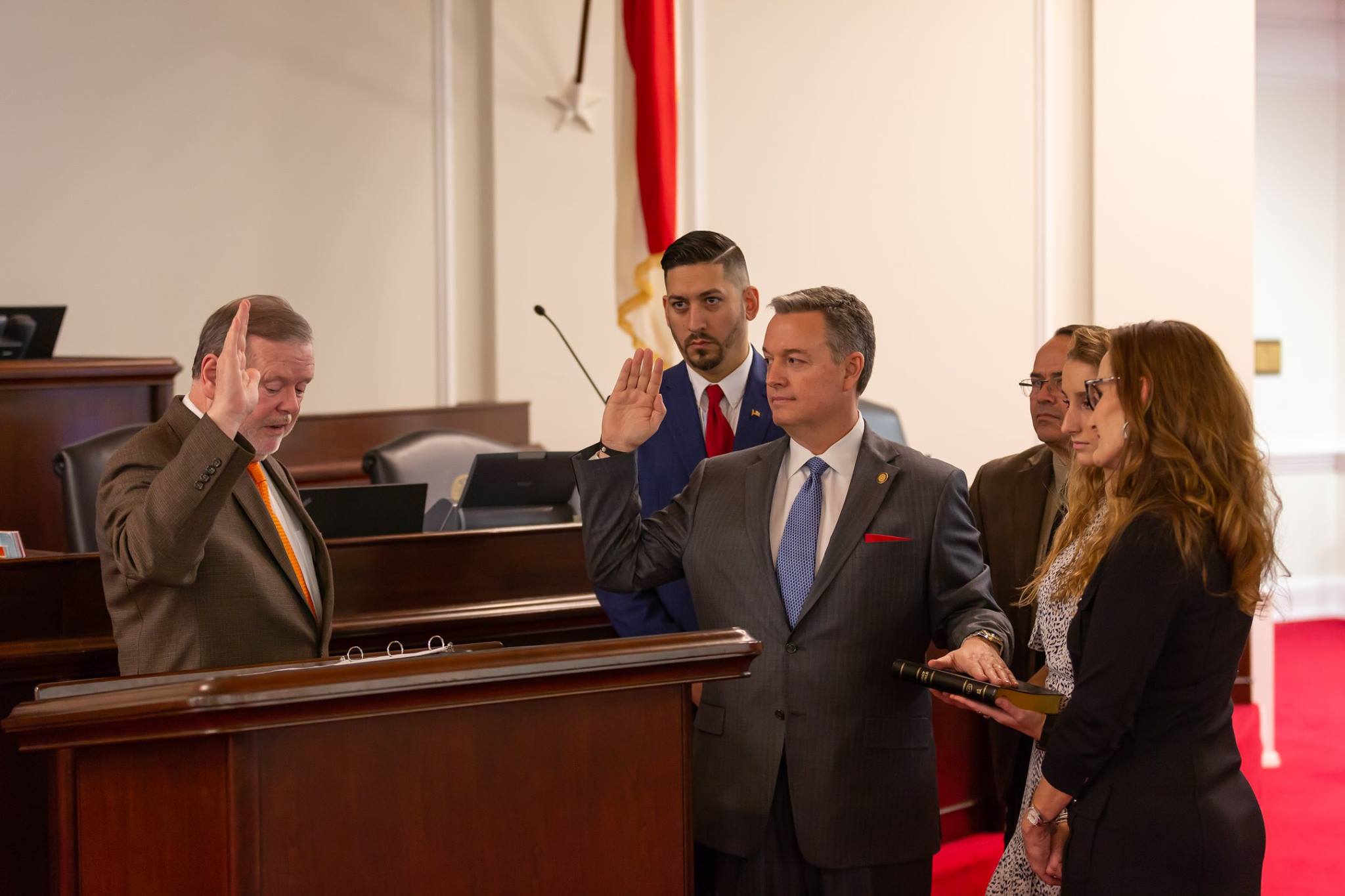As a new crop of N.C. elected officials assume office, many of them are choosing to be sworn in close to home.
- Sen. Wiley Nickel was sworn in at Cary Town Hall.
- Sen. Harper Peterson took her oath at Bakery 105 in Wilmington.
- Sen. Kirk deViere chose the U.S. Army Airborne & Special Operations Museum in Fayetteville.
- Rep. Chris Humphrey was sworn in at Lenoir Community College.
While new Congress members trek to Washington for their official swearing ceremony, North Carolina’s elected officials have more latitude on when and where they take their oath of office. New General Assembly members spent the past week holding ceremonies in their particular corners of the state.
Turns out, state law has all sorts of rules regarding oaths — but none that require a particular
When do new elected officials take office?
According to state law, the new General Assembly officially takes office on January 1 of the odd year following the November election.
The same goes for most state-level elected officials. And some can’t wait long to get started. Gov. Roy Cooper (D) and new Insurance Commissioner Mike Causey (R) were sworn in just minutes after midnight on Jan. 1, 2017.
Why choose a swearing in close to home?
Returning members of the General Assembly generally get sworn in en masse during a ceremony on the first day of the biennium. By law, this is on the second Wednesday of January. At this time, the state legislature convenes for procedural motions, leadership elections and rule changes, then adjourns until the end of the month.
In 2019, the ceremonial first day is January 9, but work begins in earnest on January 30.
But this mass ceremony doesn’t allow for individual attention (here’s a photo). Plus, each elected official is only allowed a small number of guests to attend — just three, according to the Carolina Journal.
That’s why a lot of first-time elected officials choose to host special swearing-in ceremonies to take their oath of office. They can invite as many people as they want, and the cameras are only on them.
What is the oath of office?
At the swearing-in, incoming elected officials take their oath of office. North Carolina law takes this extremely seriously. The state constitution specifically requires the General Assembly and governor to take an oath before serving.
It goes like this: “I, ___, do solemnly swear (or affirm) that I will support and maintain the Constitution and laws of the United States, and the Constitution and laws of North Carolina not inconsistent therewith, and that I will faithfully discharge the duties of my office as ___, so help me God.”
There are a lot of different oaths for other elected officials spelled out in state law. Chapter 11 of the General Statues spells a lot of them out — including the oaths for:
- State attorney general
- State auditor
- Clerk of the Supreme Court
- Clerk of Superior Court
- Register of Deeds
- Secretary of State
- Sheriff
- State treasurer
- County treasurer
And a handful more.
Also noteworthy: Each elected official must both “take” and “subscribe” the oath. They must actually sign their name to a written copy of the oath.
Who can administer the oath of office?
You have a pretty wide selection of people. By law, there are a handful of categories to choose from:
- Court officials. This includes any justice, judge, magistrate, clerk, assistant clerk, or deputy clerk of the court system, a retired justice or judge, or any member of the federal judiciary.
- Secretary of State
- Any notary public
- Register of Deeds
- Any mayor
- Chairman of a county board of commissioners
- General Assembly member
- The clerk of any county, city, town or incorporated village
What do you have to swear in on?
According to a state law that dates back to 1777, North Carolina elected officials must be sworn in on “the Holy Scriptures.”
This has been interpreted pretty broadly by the courts, though, and other sacred texts are acceptable for non-Christians.
Even the 1777 law allowed for oaths to be taken by a raised hand instead of the Scriptures if somebody is “conscientiously scrupulous of taking a book oath.”
When do local officials get sworn in?
By law, county commissioners, sheriffs, and most other local elected officials take office and are sworn in on the first Monday of December following their election.
What happens if you don’t take an oath of office?
Like we said, North Carolina takes its oaths extremely seriously. Discharging public duties without having taken an oath is a crime.
A misdemeanor, to be exact, punishable by a $500 fine and getting kicked out of office.
Cover image via Sen. Jim Perry on Facebook

